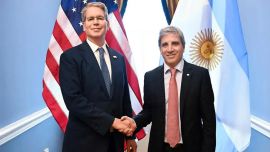US President Donald Trump has put some of his “America First” capital online by greenlighting a multi-billion-dollar rescue package for Argentina – or more specifically, President Javier Milei.
US Treasury Secretary Scott Bessent confirmed Thursday that Washington had bought Argentine pesos and finalised a US$20-billion economic support programme to help prop up the nation's faltering finances and calm turbulent currency markets.
Milei, a close ally of Trump, swiftly thanked the US leader for his "vision and powerful leadership.”
"Together, as close allies, we will build a hemisphere of economic freedom and prosperity," the La Libertad Avanza leader said, welcoming Bessent’s announcement.
With Argentina’s reserves desperately depleted, Bessent’s announcement is expected to calm market doubts ahead of this month’s midterm elections.
Argentina’s Central Bank was recently forced to sell more than US$1 billion in three days to prop up the peso, though it refrained from intervention on Thursday, perhaps anticipating the US announcement.
Milei had been struggling with market turbulence after a defeat in regional elections in Buenos Aires Province that were seen as a bellwether for the upcoming national elections.
“Argentina faces a moment of acute illiquidity,” Bessent wrote on social media Thursday, stating that Washington was well-positioned to act quickly.
“To that end, today we directly purchased Argentine pesos,” the Treasury chief said. “Additionally, we have finalised a US$20-billion currency swap framework with Argentina’s central bank.”
Bessent stressed that the US Treasury is “prepared, immediately, to take whatever exceptional measures are warranted to provide stability to markets.”
It’s the third time the official has made such a comment in the past two months.
Bessent’s comments on X came after four days of meetings with Argentina’s Economy Minister Luis Caputo in Washington.
Trump and Milei are due to meet at the White House next week, on October 14, for a high-profile meeting.
The US Treasury secretary said he plans to see Caputo again next week on the sidelines of the annual meetings of the International Monetary Fund and World Bank in Washington.
The IMF has a role in this financial aid package, which Bessent assured last week was not “a bailout”.
“Minister Caputo informed me of his close coordination with the IMF on Argentina’s commitments under its bilateral programme,” Bessent recalled.
Argentina already has a US$20-billion credit line with the Fund, agreed in April. In 2018, it took on a US$57-billion programme under the administration of former president Mauricio Macri, of which it received US$44.5 billion.
Bloomberg estimates that Argentina’s overall debt with the Fund stands at around US$55 million.
‘Systemic importance’
The Donald Trump administration’s pledge to support Argentina has faced criticism, with several Democratic lawmakers calling on Trump last month to halt his plan.
In a letter, they pointed to Argentina’s recent decision to temporarily suspend soybean export taxes, a move that they said undercut US farmers – who are already facing multiple challenges – in the global market.
Bessent has previously defended the plans. He told CNBC in early October that “as far as what the US is doing, just to be clear, we are giving them a swap line. We are not putting money into Argentina.”
The US official said Thursday that “the success of Argentina’s reform agenda is of systemic importance” as well.
He said “a strong, stable Argentina which helps anchor a prosperous Western Hemisphere is in the strategic interest of the United States,” arguing that its success should be a bipartisan priority.
At the start of the month, Bessent told CNBC that many governments in South America “moved from far-left to centre-right. We did not support them, and then they took a hard lurch to the left.”
At the time, he called Argentina a “beacon,” adding that other countries could follow its lead.
Bessent described an optimistic economic outlook for his Southern Cone ally, despite the pressure that Argentina’s debt and national currency have been under for weeks.
“Argentina’s policies, when anchored in fiscal discipline, are sound. Its exchange rate band remains adequate,” he said in his message.
Bessent said during his conversations with Caputo, he was reassured by the “focus on achieving fiscally sound economic freedom for the people of Argentina via lower taxes, higher investment, private sector job creation, and partnering with allies.”
“As Argentina lifts the dead weight of the state and stops spending into inflation, great things are possible,” he added.
– TIMES/AFP/NA























Comments